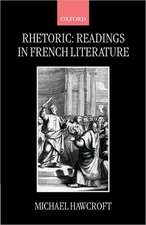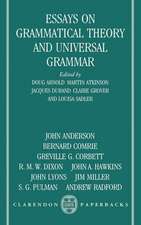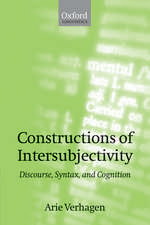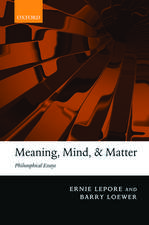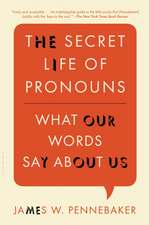The Politics and Rhetoric of Commemoration: How the Portuguese Parliament Celebrates the 1974 Revolution: Bloomsbury Advances in Critical Discourse Studies
Autor Professor Michael Billig, Dr Cristina Marinhoen Limba Engleză Paperback – 6 feb 2019
| Toate formatele și edițiile | Preț | Express |
|---|---|---|
| Paperback (1) | 230.43 lei 6-8 săpt. | +84.29 lei 5-11 zile |
| Bloomsbury Publishing – 6 feb 2019 | 230.43 lei 6-8 săpt. | +84.29 lei 5-11 zile |
| Hardback (1) | 773.45 lei 6-8 săpt. | |
| Bloomsbury Publishing – 12 iul 2017 | 773.45 lei 6-8 săpt. |
Preț: 230.43 lei
Preț vechi: 296.90 lei
-22% Nou
Puncte Express: 346
Preț estimativ în valută:
44.09€ • 46.15$ • 36.70£
44.09€ • 46.15$ • 36.70£
Carte tipărită la comandă
Livrare economică 31 martie-14 aprilie
Livrare express 22-28 februarie pentru 94.28 lei
Preluare comenzi: 021 569.72.76
Specificații
ISBN-13: 9781350099159
ISBN-10: 1350099155
Pagini: 232
Dimensiuni: 156 x 234 x 19 mm
Greutate: 0.33 kg
Editura: Bloomsbury Publishing
Colecția Bloomsbury Academic
Seria Bloomsbury Advances in Critical Discourse Studies
Locul publicării:London, United Kingdom
ISBN-10: 1350099155
Pagini: 232
Dimensiuni: 156 x 234 x 19 mm
Greutate: 0.33 kg
Editura: Bloomsbury Publishing
Colecția Bloomsbury Academic
Seria Bloomsbury Advances in Critical Discourse Studies
Locul publicării:London, United Kingdom
Caracteristici
Critically analyses the use of political discourse and rhetoric but also to insist on a more social psychological analysis in order to investigate what actions speakers are performing with their discourse
Notă biografică
Michael Billig has been Professor of Social Sciences at Loughborough University, UK, since 1986. He was previously a lecturer in Psychology at Birmingham University, UK. He is a Founder member of the Discourse and Rhetoric Group at Loughborough University.Cristina Marinho is at Nottingham Trent University, UK.
Cuprins
1. Introduction2. 25th April 1974: significant presences and absences3. The Parliamentary Ceremony: openings and closings4. Politics, Parties and Persuasion 5. The Left: remembering to forget the day6. The Right: forgetting to remember the day7. Manipulating and Celebrating8. Concluding Remarks: avoiding or repressing memoryBibliographyIndex
Recenzii
A very interesting and valuable read. The stimulating writing style, punctuated by thought-provoking questions and the authors' affable sense of humour, contribute to its value.
Billig and Marinho have done a masterful job of bringing together perspectives and research from such fields as commemoration and memory studies, critical discourse analysis, pragmatics and epideictic rhetoric, all examined against a background of Portuguese history and political science ... Their fine-grained analyses are the result of meticulous work ... A welcome and important addition to the literature.
This excellent book allows insight in to the intricate symbolic struggles for hegemonic identity narratives in the Portuguese society, into what is said, but more importantly, what remains unsaid and why. A must-read for scholars and students trying to understand the impact of the politics of the past on present and future social developments.
Michael Billig's and Cristina Marinho's meticulously researched and highly engaging study of the parliamentary commemorations of the Portuguese Revolution demonstrates why it is important to pay close attention to what politicians say, and, more importantly, what they do not say when they remember the national past. Behind what might, at first sight, seem like the formalities of commemorative language and practices - the modes of address, patterns of applause, symbolic gestures like the wearing of carnations, and so on - Billig and Marinho uncover the murky world of partisan politics, and use it to provide a fascinating and original insight into the art of political manipulation.
This book is a brilliant, cultivated and timely case study about national commemorations, political celebration and collective memory. The authors have produced an in-depth study of the annual celebration of Portugal's liberation from dictatorship, and gone beyond the polysemy, ambiguity and controversial nature of this highly particular event. Indeed, they offer an invaluable contribution to the understanding of contemporary political celebrations, political culture and nationalism at a time when democracy is under pressure.
Billig and Marinho have done a masterful job of bringing together perspectives and research from such fields as commemoration and memory studies, critical discourse analysis, pragmatics and epideictic rhetoric, all examined against a background of Portuguese history and political science ... Their fine-grained analyses are the result of meticulous work ... A welcome and important addition to the literature.
This excellent book allows insight in to the intricate symbolic struggles for hegemonic identity narratives in the Portuguese society, into what is said, but more importantly, what remains unsaid and why. A must-read for scholars and students trying to understand the impact of the politics of the past on present and future social developments.
Michael Billig's and Cristina Marinho's meticulously researched and highly engaging study of the parliamentary commemorations of the Portuguese Revolution demonstrates why it is important to pay close attention to what politicians say, and, more importantly, what they do not say when they remember the national past. Behind what might, at first sight, seem like the formalities of commemorative language and practices - the modes of address, patterns of applause, symbolic gestures like the wearing of carnations, and so on - Billig and Marinho uncover the murky world of partisan politics, and use it to provide a fascinating and original insight into the art of political manipulation.
This book is a brilliant, cultivated and timely case study about national commemorations, political celebration and collective memory. The authors have produced an in-depth study of the annual celebration of Portugal's liberation from dictatorship, and gone beyond the polysemy, ambiguity and controversial nature of this highly particular event. Indeed, they offer an invaluable contribution to the understanding of contemporary political celebrations, political culture and nationalism at a time when democracy is under pressure.









